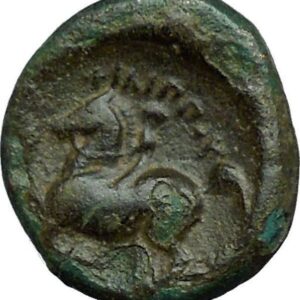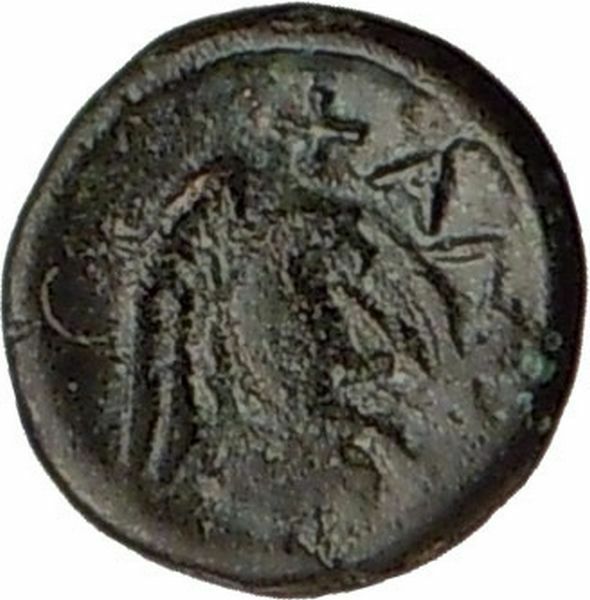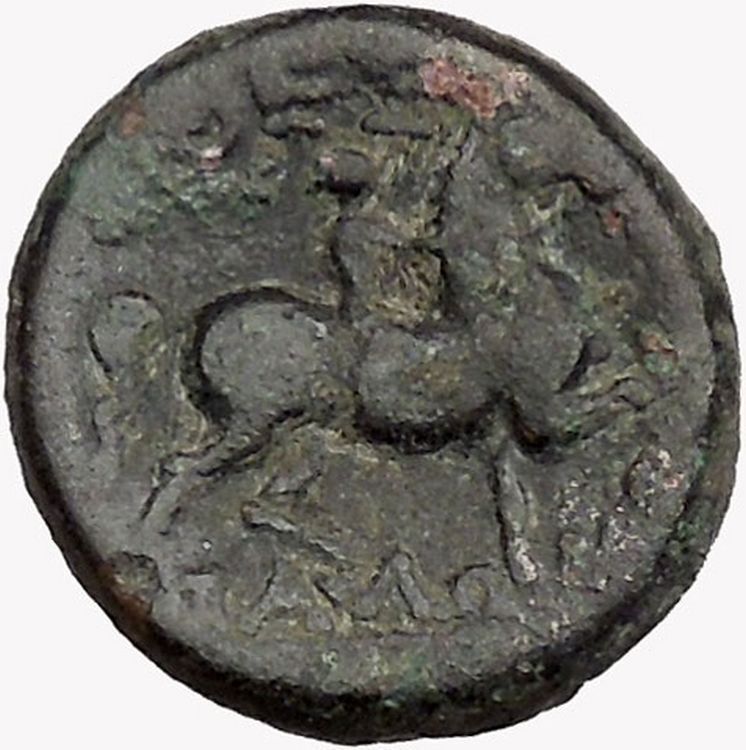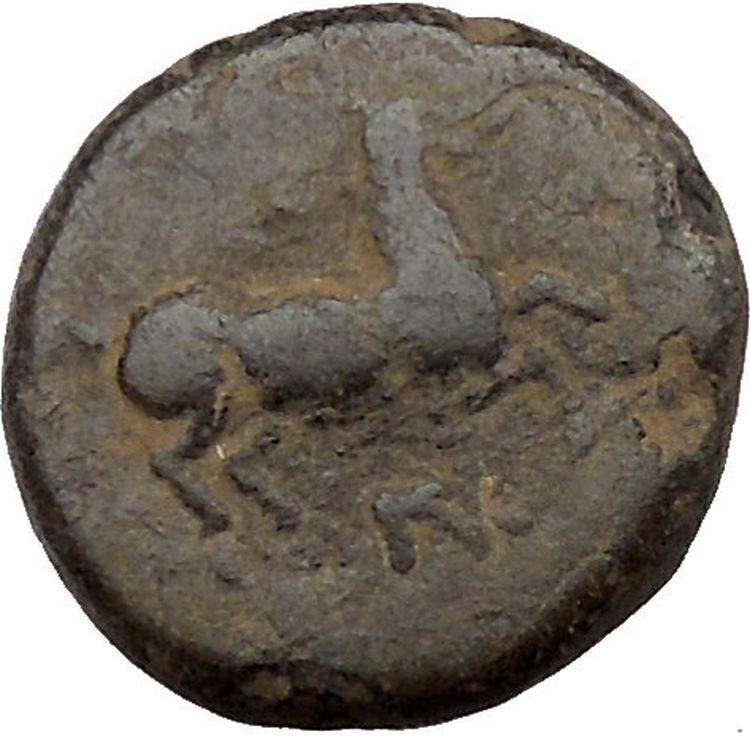|
Greek city of Phokaia in Ionia
Bronze 11mm (2.12 grams) Struck circa 350-300 B.C.
Reference: Sear 4537; B.M.C.14.216,92
Head of nymph Prokaia left, hair in sphendone.
Head of griffin left.
A coastal city of considerable importance, situated forty miles north-west of Smyrna, Phokaia was one of the first mints, producing electrum coinage from early in the 6th century until the time of Alexander, a series that was produced in conjunction with the Lesbian mint of Mytilene.
You are bidding on the exact item pictured, provided with a Certificate of Authenticity and Lifetime Guarantee of Authenticity.
 A nymph in Greek mythology and in Latin mythology is a minor female nature deity typically associated with a particular location or landform. Different from goddesses, nymphs are generally regarded as divine spirits who animate nature, and are usually depicted as beautiful, young nubile maidens who love to dance and sing; their amorous freedom sets them apart from the restricted and chaste wives and daughters of the Greek polis. They are believed to dwell in mountains and groves, by springs and rivers, and also in trees and in valleys and cool grottoes. Although they would never die of old age nor illness, and could give birth to fully immortal children if mated to a god, they themselves were not necessarily immortal, and could be beholden to death in various forms. Charybdis and Scylla were once nymphs. A nymph in Greek mythology and in Latin mythology is a minor female nature deity typically associated with a particular location or landform. Different from goddesses, nymphs are generally regarded as divine spirits who animate nature, and are usually depicted as beautiful, young nubile maidens who love to dance and sing; their amorous freedom sets them apart from the restricted and chaste wives and daughters of the Greek polis. They are believed to dwell in mountains and groves, by springs and rivers, and also in trees and in valleys and cool grottoes. Although they would never die of old age nor illness, and could give birth to fully immortal children if mated to a god, they themselves were not necessarily immortal, and could be beholden to death in various forms. Charybdis and Scylla were once nymphs.
Other nymphs, always in the shape of young maidens, were part of the retinue of a god, such as Dionysus, Hermes, or Pan, or a goddess, generally the huntress Artemis. Nymphs were the frequent target of satyrs.
Etymology
Nymphs are personifications of the creative and fostering activities of nature, most often identified with the life-giving outflow of springs: as Walter Burkert (Burkert 1985:III.3.3) remarks, “The idea that rivers are gods and springs divine nymphs is deeply rooted not only in poetry but in belief and ritual; the worship of these deities is limited only by the fact that they are inseparably identified with a specific locality.”
The Greek word νύμφη has “bride” and “veiled” among its meanings: hence a marriageable young woman. Other readers refer the word (and also Latin nubere and German Knospe) to a root expressing the idea of “swelling” (according to Hesychius, one of the meanings of νύμφη is “rose-bud”).
Adaptations
The Greek nymphs were spirits invariably bound to places, not unlike the Latin genius loci, and the difficulty of transferring their cult may be seen in the complicated myth that brought Arethusa to Sicily. In the works of the Greek-educated Latin poets, the nymphs gradually absorbed into their ranks the indigenous Italian divinities of springs and streams (Juturna, Egeria, Carmentis, Fontus), while the Lymphae (originally Lumpae), Italian water-goddesses, owing to the accidental similarity of their names, could be identified with the Greek Nymphae. The mythologies of classicizing Roman poets were unlikely to have affected the rites and cult of individual nymphs venerated by country people in the springs and clefts of Latium. Among the Roman literate class, their sphere of influence was restricted, and they appear almost exclusively as divinities of the watery element. Nymphs are also portrayed as selfish and as attention seekers who walk around naked in the middle of forests.

In this 1896 painting by John William Waterhouse, Hylas is abducted by the Naiads, i.e. fresh water nymphs

Echo, an Oread (mountain nymph) watches Narcissus in this 1903 painting by John William Waterhouse.
 The griffin is a legendary creature with the body, tail, and back legs of a lion; the head and wings of an eagle; and an eagle’s talons as its front feet. As the lion was traditionally considered the king of the beasts and the eagle was the king of the birds, the griffin was thought to be an especially powerful and majestic creature. The griffin was also thought of as king of the creatures. Griffins are known for guarding treasure and priceless possessions. Adrienne Mayor, a classical folklorist, proposes that the griffin was an ancient misconception derived from the fossilized remains of the Protoceratops found in gold mines in the Altai mountains of Scythia, in present day southeastern Kazakhstan, or in Mongolia.In antiquity it was a symbol of divine power and a guardian of the divine. Some have suggested that the word griffin is cognate with Cherub. The griffin is a legendary creature with the body, tail, and back legs of a lion; the head and wings of an eagle; and an eagle’s talons as its front feet. As the lion was traditionally considered the king of the beasts and the eagle was the king of the birds, the griffin was thought to be an especially powerful and majestic creature. The griffin was also thought of as king of the creatures. Griffins are known for guarding treasure and priceless possessions. Adrienne Mayor, a classical folklorist, proposes that the griffin was an ancient misconception derived from the fossilized remains of the Protoceratops found in gold mines in the Altai mountains of Scythia, in present day southeastern Kazakhstan, or in Mongolia.In antiquity it was a symbol of divine power and a guardian of the divine. Some have suggested that the word griffin is cognate with Cherub.
Phocaea, or Phokaia, (Greek: Φώκαια) (modern-day Foça in Turkey) was an ancient Ionian Greek city on the western coast of Anatolia. Greek colonists from Phocaea founded the colony of Massalia (modern day Marseille, in France) in 600 BC, Emporion (modern day Empúries, in Catalonia, Spain) in 575 BC and Elea (modern day Velia, in Campania, Italy) in 540 BC.
Geography
Phocaea was the northernmost of the Ionian cities, on the boundary with Aeolis. It was located near the mouth of the river Hermus (now Gediz), and situated on the coast of the peninsula separating the Gulf of Cyme to the north, named for the largest of the Aeolian cities, and the Gulf of Smyrna (now İzmir) to the south.
Phocaea had two natural harbours within close range of the settlement, both containing a number of small islands. Phocaea’s harbours allowed it to develop a thriving seafaring economy, and to become a great naval power, which greatly influenced its culture.
Recent archaeological surveys have shown that the city of Phocaea was large for the archaic period. Herodotus gives an idea of the size of Phocaea by the describing the walls of Phocaea as having a diameter of 5 km, large even by modern standards. Phocaea was one of the largest cities in the ancient world.
History
The ancient Greek geographer Pausanias says that Phocaea was founded by Phocians under Athenian leadership, on land given to them by the Aeolian Cymaeans, and that they were admitted into the Ionian League after accepting as kings the line of Codrus. Pottery remains indicate Aeolian presence as late as the 9th century BC, and Ionian presence as early as the end of the 9th century BC. From this an approximate date of settlement for Phocaea can be inferred.
According to Herodotus the Phocaeans were the first Greeks to make long sea-voyages, having discovered the coasts of the Adriatic, Tyrrhenia and Spain. Herodotus relates that they so impressed Arganthonios, king of Tartessus in Spain, that he invited them to settle there, and, when they declined, gave them a great sum of money to build a wall around their city.
Their sea travel was extensive. To the south they probably conducted trade with the Greek colony of Naucratis in Egypt, which was the colony of their fellow Ionian city Miletus. To the north, they probably helped settle Amisos (Samsun) on the Black Sea, and Lampsacus at the north end of the Hellespont (now the Dardanelles). However Phocaea’s major colonies were to the west. These included Alalia in Corsica, Emporiae and Rhoda in Spain, and especially Massalia (Marseille) in France.
Phocaea remained independent until the reign of the Lydian king Croesus (circa 560-545 BC), when they, along with the rest of mainland Ionia, first, fell under Lydian control and then, along with Lydia (who had allied itself with Sparta) were conquered by Cyrus the Great of Persia in 546 BC, in one of the opening skirmishes of the great Greco-Persian conflict.
Rather than submit to Persian rule, the Phocaeans abandoned their city. Some may have fled to Chios, others to their colonies on Corsica and elsewhere in the Mediterranean, with some eventually returning to Phocaea. Many however became the founders of Elea, around 540 BC.
In 500 BC, Phocaea joined the Ionian Revolt against Persia. Indicative of its naval prowess, Dionysius, a Phocaean was chosen to command the Ionian fleet at the decisive Battle of Lade, in 494 BC. However, indicative of its declining fortunes, Phocaea was only able to contribute three ships, out of a total of “three hundred and fifty three”. The Ionian fleet was defeated and the revolt ended shortly thereafter.
After the defeat of Xerxes I by the Greeks in 480 BC and the subsequent rise of Athenian power, Phocaea joined the Delian League, paying tribute to Athens of two talents. In 412 BC, during the Peloponnesian War, with the help of Sparta, Phocaea rebelled along with the rest of Ionia. The Peace of Antalcidas, which ended the Corinthian War, returned nominal control to Persia in 386 BC.
In 343 BC, the Phocaeans unsuccessfully laid siege to Kydonia on the island of Crete.
During the Hellenistic period it fell under Seleucid, then Attalid rule.
It was later briefly under the control of Benedetto Zaccaria, the Genoan ambassador to Byzantium; Zaccaria amassed a considerable fortune from his properties there. It remained a Genoese colony until it was taken by the Turks in 1455. It is a titular see of the Roman Catholic Church.
Coinage
Probably following the Lydians, the Phocaeans were among the earliest in the world to make and use coins as money. Its earliest coins were made of electrum, a naturally occurring alloy of silver and gold. The British Museum has a Phocaean coin containing the image of a seal dating from 600-550 BC.
|





 A nymph in Greek mythology and in Latin mythology is a minor female nature deity typically associated with a particular location or landform. Different from goddesses, nymphs are generally regarded as divine spirits who animate nature, and are usually depicted as beautiful, young nubile maidens who love to dance and sing; their amorous freedom sets them apart from the restricted and chaste wives and daughters of the Greek polis. They are believed to dwell in mountains and groves, by springs and rivers, and also in trees and in valleys and cool grottoes. Although they would never die of old age nor illness, and could give birth to fully immortal children if mated to a god, they themselves were not necessarily immortal, and could be beholden to death in various forms. Charybdis and Scylla were once nymphs.
A nymph in Greek mythology and in Latin mythology is a minor female nature deity typically associated with a particular location or landform. Different from goddesses, nymphs are generally regarded as divine spirits who animate nature, and are usually depicted as beautiful, young nubile maidens who love to dance and sing; their amorous freedom sets them apart from the restricted and chaste wives and daughters of the Greek polis. They are believed to dwell in mountains and groves, by springs and rivers, and also in trees and in valleys and cool grottoes. Although they would never die of old age nor illness, and could give birth to fully immortal children if mated to a god, they themselves were not necessarily immortal, and could be beholden to death in various forms. Charybdis and Scylla were once nymphs.

 The griffin is a legendary creature with the body, tail, and back legs of a lion; the head and wings of an eagle; and an eagle’s talons as its front feet. As the lion was traditionally considered the king of the beasts and the eagle was the king of the birds, the griffin was thought to be an especially powerful and majestic creature. The griffin was also thought of as king of the creatures. Griffins are known for guarding treasure and priceless possessions. Adrienne Mayor, a classical folklorist, proposes that the griffin was an ancient misconception derived from the fossilized remains of the Protoceratops found in gold mines in the Altai mountains of Scythia, in present day southeastern Kazakhstan, or in Mongolia.In antiquity it was a symbol of divine power and a guardian of the divine. Some have suggested that the word griffin is cognate with Cherub.
The griffin is a legendary creature with the body, tail, and back legs of a lion; the head and wings of an eagle; and an eagle’s talons as its front feet. As the lion was traditionally considered the king of the beasts and the eagle was the king of the birds, the griffin was thought to be an especially powerful and majestic creature. The griffin was also thought of as king of the creatures. Griffins are known for guarding treasure and priceless possessions. Adrienne Mayor, a classical folklorist, proposes that the griffin was an ancient misconception derived from the fossilized remains of the Protoceratops found in gold mines in the Altai mountains of Scythia, in present day southeastern Kazakhstan, or in Mongolia.In antiquity it was a symbol of divine power and a guardian of the divine. Some have suggested that the word griffin is cognate with Cherub.




